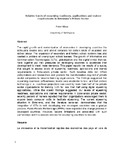| dc.contributor.author | Nleya, P.T. | |
| dc.date.accessioned | 2012-11-15T12:47:40Z | |
| dc.date.available | 2012-11-15T12:47:40Z | |
| dc.date.issued | 2009 | |
| dc.identifier.citation | Nleya, P.T. (2009) Relative levels of elarning readiness, applications and trainee requirements in Botswana's private sector, Canadian Journal of Learning and Technology, Vol. 35 No. 1, pp. 1 - 19 | en_US |
| dc.identifier.issn | 1499-6685 | |
| dc.identifier.uri | http://hdl.handle.net/10311/1046 | |
| dc.description.abstract | The rapid growth and modernization of economies in developing countries like
Botswana creates new and unmet demands for certain kinds of educated and skilled labour. The expansion of secondary and tertiary school systems has also
created a problem of unemployed school leavers. The growth of Information and
Communication Technologies (ICTs), globalization and the digital divide likewise, have together put new pressures on developing countries to accelerate their
development to meet these demands. This paper reports the results of a survey
that sought to assess levels of eLearning readiness, applications and trainee
requirements in Botswana’s private sector. Such baseline data can inform
policymakers and researchers and promote the transformation required of private
sector companies to become learning organizations. The findings suggested that eLearning readiness (eReadiness) levels were moderate to low, and that archaic technology (i.e., overhead projection) was used by more than half of the private
sector organizations for training (with far less than half using digital eLearning
applications). While the overall findings suggested low levels of eLearning
readiness, applications and trainee requirements in Botswana’s private sector, seventy percent of trainers reported that their organizations encouraged them to
acquire basic computer skills to facilitate eLearning. The current eLearning
situation in Botswana, and the literature reviewed, demonstrates that the integration of ICTs in both developing and developed countries was a gradual
process. Public-Private Partnerships (PPPs) have expedited the change process in
developed countries. However, several limitations are associated with such partnerships and this renders lessons for developing countries to emulate. | en_US |
| dc.language.iso | en | en_US |
| dc.publisher | Athabasca University Press, http://www.aupress.ca/index.php | en_US |
| dc.subject | Educational technology | en_US |
| dc.subject | Internet | en_US |
| dc.subject | Information technology | en_US |
| dc.subject | Computer uses in education | en_US |
| dc.subject | Electronic learning | en_US |
| dc.title | Relative levels of eLearning readiness, applications and trainee requirements in Botswana’s private sector | en_US |
| dc.type | Published Article | en_US |
| dc.link | http://www.cjlt.ca/index.php/cjlt/article/view/511/241 | en_US |

